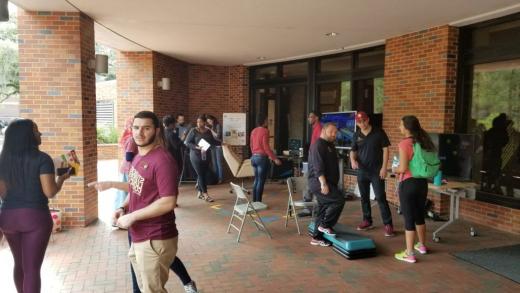Whether you are an undergraduate, a graduate student, or a professional entering the workforce, you know that life can get a little overwhelming. Managing school, work, personal relationships, workout routines, and social activities can be challenging. Everything seems to be so important that we lose sight of the most important part of our lives: ourselves. Wellness and self-care should be something we think about every day, but the reality of modern living means that oftentimes our own wellbeing is one of the last things we consider.

That idea that we don't prioritize our own wellbeing is one of the reasons behind the College of Education's Wellness Week. Hosted by the Student Leadership Council, the inaugural Wellness Week took place February 26 to March 2 and was all about promoting the mental and physical wellness of students. Events designed to help students de-stress and engaging talks from doctoral candidates and faculty invited students to take a moment and reflect on their own wellbeing. Attendees learned how to make healthy foods, meditate, do yoga, and more. 
Even though Wellness Week is behind us, it's still important to promote positive mental and physical health all year long. One of the most important messages stressed by a number of the Wellness Week speakers was self-acceptance. I approach wellness by giving myself grace and compassion to live life, says Jaymee Spannring, who presented on suicide prevention during Wellness Week. Sometimes, [life] is messy and sometimes things work out perfectly. Allowing myself grace and compassion allows me to prioritize what I need most. Brandon Cooper, who presented on self-compassion, echoes the sentiment: Looking out for one's self is critical.
Many of us tend to think about wellness either physically or mentally, but another theme of the week was the union between these two halves. Many events promoted both a healthy lifestyle while stressing the importance of mental wellness. For instance, the guided yoga session encouraged students to engage in healthy exercise and to center their minds. Life gets busy, says Spannring. Everyone needs to find time to exercise (whatever that means to you). This allows you to unwind and gives your mind a break, too. Of course, even for people following healthy wellness practices, there might be times when you feel overwhelmed. It is important to understand how to be self-compassionate in these moments. We spend enough time thinking about the past and about the future, Cooper says. We lose the beauty and preciousness of the present moment. When things feel tough or unmanageable, take time to give yourself love in the present moment. Spannring encourages students to open up to someone close to them if they are struggling or, if they want more confidential help, turn to the University Counseling Center, which is open 24 hours a day, 7 days a week. The most important step to using any resource is taking the step to ask for help, she says.
Of course, even for people following healthy wellness practices, there might be times when you feel overwhelmed. It is important to understand how to be self-compassionate in these moments. We spend enough time thinking about the past and about the future, Cooper says. We lose the beauty and preciousness of the present moment. When things feel tough or unmanageable, take time to give yourself love in the present moment. Spannring encourages students to open up to someone close to them if they are struggling or, if they want more confidential help, turn to the University Counseling Center, which is open 24 hours a day, 7 days a week. The most important step to using any resource is taking the step to ask for help, she says.
Here are some invaluable resources available to all FSU students, faculty and staff:
University Counseling Center: (850) 644-TALK (8255)
Case Management Services: (850) 644-2428
Victim Advocate Program: (850) 644-7161
University Health Services: (850) 644-6230
Faculty/Employee Assistance Program: (850) 644-2288
FSU Police Department: (850) 644-1234
You can also help those around you by simply asking, How are you doing? No one expects or wants you to be a therapist, but the act of listening and communicating concern can make a huge difference in someone's life. In the most serious circumstances, simply showing interest in someone's wellbeing can be the difference between life or death; there have been many documented cases where someone who was thinking about suicide reconsidered simply because someone talked to them.
These days, taking care of your wellness is extremely important. Use the resources available to you at FSU, talk to friends and family who care about you, and reach out to those who need support. Supporting one another and maintaining healthy wellness habits strengthens our overall community.

